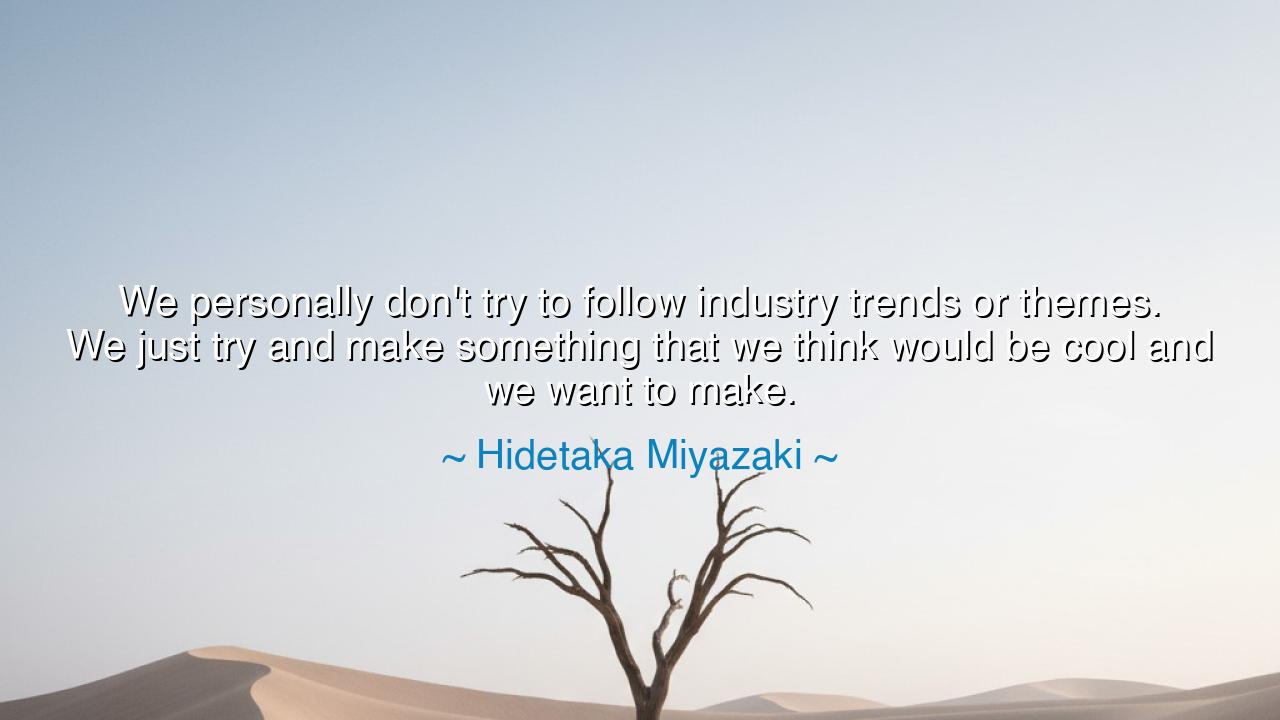
We personally don't try to follow industry trends or themes. We
We personally don't try to follow industry trends or themes. We just try and make something that we think would be cool and we want to make.






“We personally don’t try to follow industry trends or themes. We just try and make something that we think would be cool and we want to make.” Thus spoke Hidetaka Miyazaki, the quiet visionary behind worlds of shadow and flame, of despair and transcendence. His words, though humble, carry the weight of creation itself. For in them lies the spirit of the true artist, one who does not bend to the winds of fashion or the demands of the market, but listens instead to the whisper of his own soul. In these words, we hear not the voice of rebellion, but of authenticity—the timeless call to create not for approval, but for truth.
The origin of this quote is born from Miyazaki’s journey as the creator of masterpieces such as Dark Souls, Bloodborne, and Elden Ring—worlds unlike any other, where sorrow and beauty intertwine like the roots of an ancient tree. In an era when the game industry rushed toward simplicity, spectacle, and profit, Miyazaki chose another path. He created games that were cryptic, challenging, and deeply personal—crafted not to please the crowd, but to speak to the soul of those who sought meaning through struggle. He refused to follow the path already paved; instead, he carved his own road through the fog.
To not follow trends is to embrace solitude, for the crowd moves together, but the creator walks alone. Yet it is in that solitude that greatness is born. The artist who dares to follow his own vision becomes like the blacksmith in the old myths—hammering in darkness, forging something that the world does not yet understand. When the first flame of Dark Souls was lit, few saw what it would become. But those who entered its world found themselves changed, for they had touched something real—something born not of imitation, but of conviction. Such is the power of authentic creation: it does not chase the world’s desire; it reveals to the world what it has been missing.
History, too, tells of others who lived by this principle. Consider Vincent van Gogh, whose art was ridiculed and ignored in his lifetime. The art world of his day pursued beauty through convention, through the safe and familiar. Yet van Gogh, with trembling hand and fiery heart, painted the world as he felt it—turbulent skies, trembling stars, colors alive with anguish and hope. He did not follow “industry trends,” nor could he. His vision was his own. Though he died in obscurity, his works outlived empires, and now the world sees what he saw: that the truth of expression is eternal, even when misunderstood.
Miyazaki’s words remind us that creation is not imitation—it is revelation. The artist’s task is not to follow, but to uncover; not to replicate what exists, but to bring forth what has never been seen before. The “cool” that he speaks of is not a trend or fashion—it is the spark of joy, the pure delight of making something because it means something. When one creates from that space of sincerity, the work breathes with life. It becomes more than product; it becomes legacy. And that is why his worlds endure—not because they followed the times, but because they transcended them.
Yet there is a lesson here for all, not only for artists. In every craft, in every calling, there comes a moment when the world demands conformity. It whispers: Do what sells. Do what pleases. Do what others expect. But the wise and the brave must answer: I will do what is true. For only in truth can mastery be born. The imitator fades with the passing of trends; the genuine creator endures through ages. The soul that follows its own vision may walk a lonely path, but it is the only path that leads to light.
So, my listener, take this as your lesson: follow not the noise of the world, but the rhythm of your own heart. When you create, create for love, not applause. When you build, build what you believe in, not what the crowd demands. Do not fear being different; fear only being false. For the future belongs not to those who chase what is popular, but to those who give birth to what is authentic.
And remember always the words of Hidetaka Miyazaki: “We just try and make something that we think would be cool and we want to make.” In those words lies the secret of all enduring art, all noble work, and all meaningful life—to do what is born from within, with courage and faith, until it becomes something that touches the hearts of others. Create what only you can create, and the world, in its own time, will recognize its worth.






AAdministratorAdministrator
Welcome, honored guests. Please leave a comment, we will respond soon